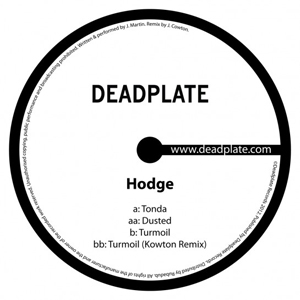Hodge Dusted EP
It’s a widely perceived trend that many producers formerly in thrall to dubstep have gradually […]

It’s a widely perceived trend that many producers formerly in thrall to dubstep have gradually slowed their tracks’ bpm. At one point (circa 2009-2010), this movement resulted in incredibly fresh mutations of UK garage, but lately, many of its practitioners have fallen into a purgatory of interminably rigid tech house. Not so in Bristol, where much of the local scene—arguably spearheaded by Peverelist—has been consistently taking bass music into wonderfully nebulous realms. Dusted, the latest EP by Hodge (a.k.a. Jacob Martin), is a fine example of this. Its tracks are adventurous enough to sit with the current crop of Bristolian productions, but also harken back to that golden moment of dubstep’s splintering.
Dusted opens with “Tonda,” which emits a vaguely tropical vibe via bird samples and a thoroughly syncopated swing. The track is firmly about its rhythm, which exists in a cloud of sub-bass, and Martin limits accompaniments to delay trails, wispy pads, and the occasional guttural stab. The title track is similarly spacious, but less immediate, as the producer gradually builds a viscous, stepping groove around white noise and dubbed-out congas. Once its main rhythm is deployed, filtered-down stabs and coarse claps compete for attention, but the mucky undercurrent keeps them pretty far from perky. On the flip, “Turmoil” initially offers up a kind of emptied-out 2-step, its rhythm accompanied by wound-up bass and distant vocal samples blurred from distinction. It’s a fairly stock formula, at least until the breakdowns; on the first, a field recording of street noise gives way to a droning sub-weight that dwarfs the preexisting bassline, while the second finds Martin letting in serene pads and a series of organ squiggles, which drop out soon after their arrival. Kowton (a.k.a. Joe Cowton) is employed to give the track a reworking to close out the record. Like Martin, Cowton tends toward the spare, though his drums have a techno-leaning punchiness, and the bass presence is less overwhelming. As with much of his work, the piece is remarkably engaging considering how few elements are utilized. Cowton methodically plays with a rhythm that brings to mind a clarified version of the one used on Actress’ “Get Ohn,” from the Splazsh LP—it’s as though he’s sent his track tumbling down a particularly long and bumpy hill, routinely obstructed as it nevertheless picks up momentum. He adds little to augment it, but he doesn’t need to. The towering pads he drapes on top, straight out of second-wave Detroit, are more than enough to heighten its sense of drama. For a track on a heavily “bass music” release, it’s a powerful reminder that the genre’s slower, housier variations can be just as dynamic.

